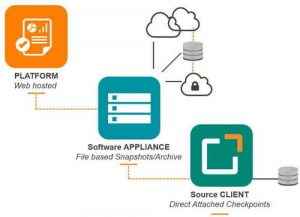Aparavi: Active Archive Platform for Protection, Retention and Archive of Unstructured Data
With classification and retention policies, support for additional cloud platforms, advanced search, and simplified installation and deployment
This is a Press Release edited by StorageNewsletter.com on May 22, 2018 at 2:19 pmAparavi Software Corporation unveiled its Active Archive platform, designed to deliver control, independence, and cost savings in the protection, retention, and archive of unstructured data.
Click to enlarge
The company has added classification and retention policies, support for additional cloud platforms, advanced search, and simplified installation and deployment. These features joint the firm’s patent-pending cloud-active data pruning, which automatically removes files that are no longer needed based on policy conditions to reduce storage requirements over time and lower recurring costs. Together the solution delivers multi-cloud, vendor-agnostic management and mobility.
Growth in unstructured data is requiring organizations to consider new approaches to protection, retention, and archive. Active Archive enables organizations to slow secondary storage growth by up to 75%, while retaining data more intelligently both on premises and in one or more clouds. The company’s SaaS-based model based on usage requires no up-front investment for lower TCO and faster ROI.
Active Archive platform gives organizations following benefits:
-
Dynamic multi-cloud mobility and control
While many vendors claim multi-cloud simply because they support more than one cloud vendor, the company delivers dynamic, policy-based mobility between and among cloud vendors and on-premises. Data is no longer locked into one place forever; organizations can adjust storage locations at any time and take advantage of an increasingly competitive cloud storage market. The platform supports public cloud services Amazon Web Services, Microsoft Azure, Google Cloud, Wasabi, and IBM Cloud, along with on-premises private clouds from Caringo, Cloudian, and Scality. -
Fine-grained control with classification and retention policies
Classification and retention policies give fine-grained control over data for better compliance and faster retrieval. In addition to preset options such as ‘legal’ or ‘confidential,’ Aparavi allows data to be classified based on content and metadata. Any tags can be defined, and retention policies can be set based upon classification. With this capability organizations can quickly and easily identify, retrieve, manage, or delete any data by its classification. One common use case is any data tagged as ‘personal identity’ can be protected according to GDPR requirements. -
Advanced search for fast retrieval
Now organizations can find specified data using advanced search based on metadata, such as creation date or file name, along with full-text content search. Users can search quickly and easily to retrieve requested documents across cloud destinations and on premises. The firm’s searches across all platforms and time, so users do not have to know where data is or when data was stored. This tool allows organizations to open up and perform data mining on what has typically been an opaque black hole of unstructured data. -
Data Pruning for storage efficiency
Company’s patent-pending storage model uses sub-file object storage and data pruning. Data pruning automatically removes data, including file increments, based on retention policies, to ensure that only the minimum amount is retained to recreate a given data point at any time. Data no longer needed is removed, releasing the space for other uses, and thereby reducing storage space requirements over time, saving on storage costs.
Click to enlarge
 Active Archive platform can be up and running in less than ten minutes. New step-by-step navigation through initial configuration and installation allows for quick on-boarding of new accounts and users as well as easy policy maintenance. The company offers organizations a 30-day free trial to test the solution with real data prior to commitment.
Active Archive platform can be up and running in less than ten minutes. New step-by-step navigation through initial configuration and installation allows for quick on-boarding of new accounts and users as well as easy policy maintenance. The company offers organizations a 30-day free trial to test the solution with real data prior to commitment.
“The real value of Aparavi is that most archive data is easily mismanaged in the cloud,” said Bob Youngquist, senior sales engineer, AMPD Game Technologies Ltd. “The Aparavi solution allows cloud data archiving to be feasible from a business and cost standpoint by providing the tools to manage cloud data today and as new clouds come to market as well.“
“Management of unstructured data has changed as organizations must contend with growing capacities, cloud and multi-cloud infrastructures, and compliance burdens,” said Edwin Yuen, senior analyst, Enterprise Strategy Group. “Aparavi Active Archive lets organizations stay flexible and dynamic, with policy-based automation for hands-off management and long-term peace of mind.“
Active Archive is available.















 Subscribe to our free daily newsletter
Subscribe to our free daily newsletter

